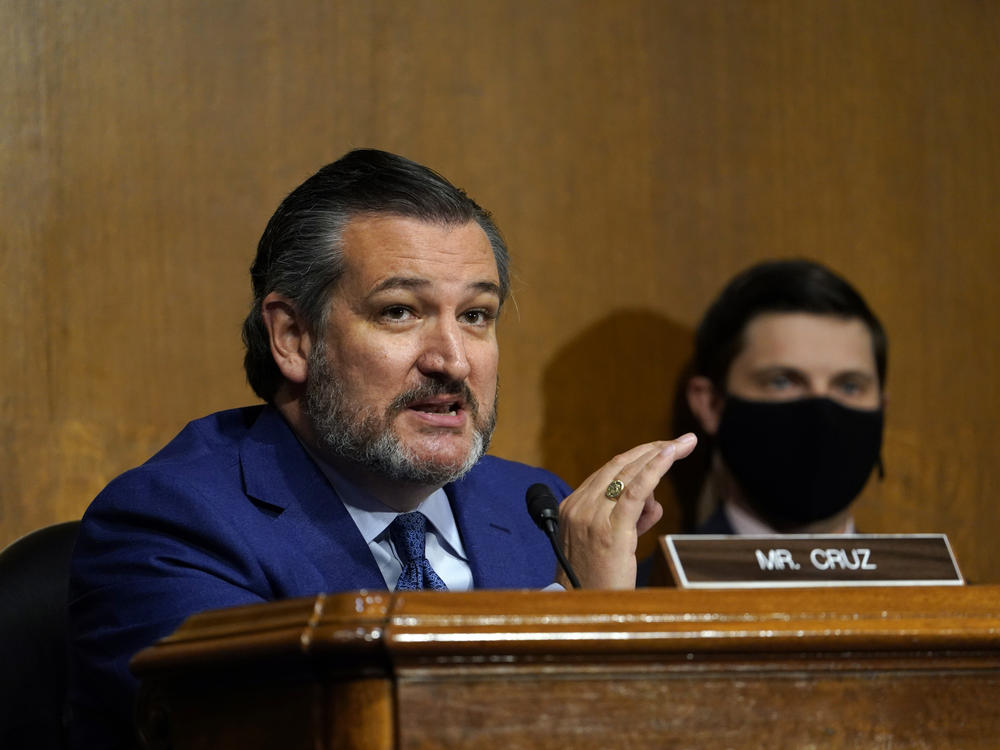Section Branding
Header Content
Pence Backs Republican Lawmakers' Plan To Object To Electoral College Results
Primary Content
Updated at 10:03 p.m. ET
A group of Republicans has announced plans to reject presidential electors from states they consider disputed if Congress doesn't create a commission to investigate their claims of fraud. The effort, fueled by baseless allegations of voter fraud, drew support from Vice President Pence by Saturday night.
The lawmakers are the latest Republicans to challenge the Jan. 6 vote to certify President-elect Joe Biden's Electoral College victory. The move will not alter Biden's path to assuming the presidency but will draw out a normally routine process.
Sens. Ted Cruz of Texas, Ron Johnson of Wisconsin, James Lankford of Oklahoma, Steve Daines of Montana, John Kennedy of Louisiana, Marsha Blackburn of Tennessee and Mike Braun of Indiana issued a joint statement Saturday claiming "unprecedented allegations of voter fraud, violations and lax enforcement of election law, and other voting irregularities."
They were joined by Sens.-elect Cynthia Lummis of Wyoming, Roger Marshall of Kansas, Bill Hagerty of Tennessee and Tommy Tuberville of Alabama.
The statement calls for the creation of an electoral commission, "with full investigatory and fact-finding authority, to conduct an emergency 10-day audit of the election returns in the disputed states."
"Accordingly, we intend to vote on January 6 to reject the electors from disputed states as not 'regularly given' and 'lawfully certified' (the statutory requisite), unless and until that emergency 10-day audit is completed," the statement goes on to say.
The statement does not mention which states the Republicans consider disputed. Nor does it provide any evidence to back up their concerns.
Later Saturday, Pence's chief of staff, Marc Short, said in a statement that Pence "shares the concerns of millions of Americans about voter fraud and irregularities in the last election."
"The Vice President welcomes the efforts of members of the House and Senate to use the authority they have under the law to raise objections and bring forward evidence before the Congress and the American people on January 6th," the statement reads.
President Trump and his legal team have targeted several states, including Wisconsin and Pennsylvania, in their attempts to overturn the election. But their legal efforts all failed because they couldn't provide clear evidence of fraud or misconduct in the 2020 election.
The lawmakers' statement comes days after Sen. Josh Hawley of Missouri promised to vote against certifying the electors' votes over concerns "about the integrity of this election."
In the House, Republican Reps. Mo Brooks from Alabama, Jody Hice of Georgia and Joe Wilson of South Carolina are among several who have also promised to challenge the Electoral College results. Brooks has said that more than 30 members of Congress plan to challenge the results.
None of the lawmakers has provided evidence to back up their concerns.
Congressional rules allow for any member of the House joined by a senator to contest the Electoral College vote. The challenge will prompt a floor debate and vote in each chamber.
But even with Saturday's announcement, most Senate Republicans, including leader Mitch McConnell, oppose intervening in the election results, viewing it as an effort likely to fail because of Democratic control of the House.
Republican Sen. Lisa Murkowski of Alaska also affirmed she would vote to certify the Electoral College results, in a statement on Saturday.
"The courts and state legislatures have all honored their duty to hear legal allegations and have found nothing to warrant overturning the results," Murkowski said.
And on Saturday evening, Sen. Mitt Romney of Utah harshly condemned the effort of fellow Republicans, calling it an "egregious ploy" that "dangerously threatens our Democratic Republic."
The objecting senators' statement cites the 1876 election between Republican Rutherford B. Hayes and Democrat Samuel Tilden as a precedent. In that election, results from several states remained in dispute, with Congress ultimately creating an electoral commission to settle the matter. The commission ended up giving the victory to Hayes by one vote.
"We should follow that precedent," Saturday's joint statement said. "Once completed, individual states would evaluate the Commission's findings and could convene a special legislative session to certify a change in their vote, if needed."
Copyright 2021 NPR. To see more, visit https://www.npr.org.

